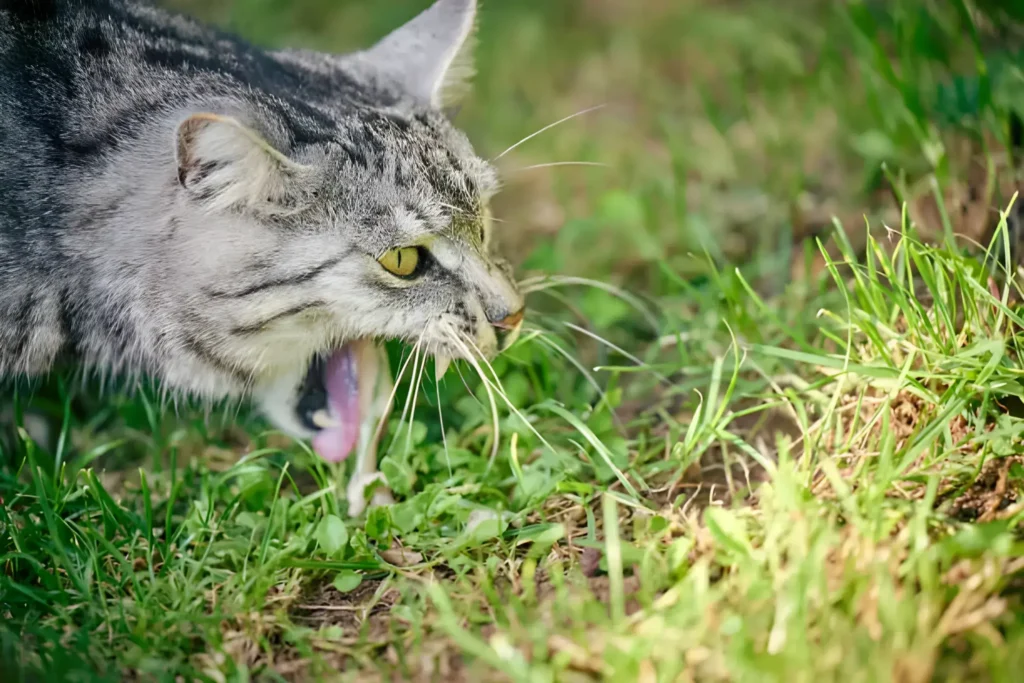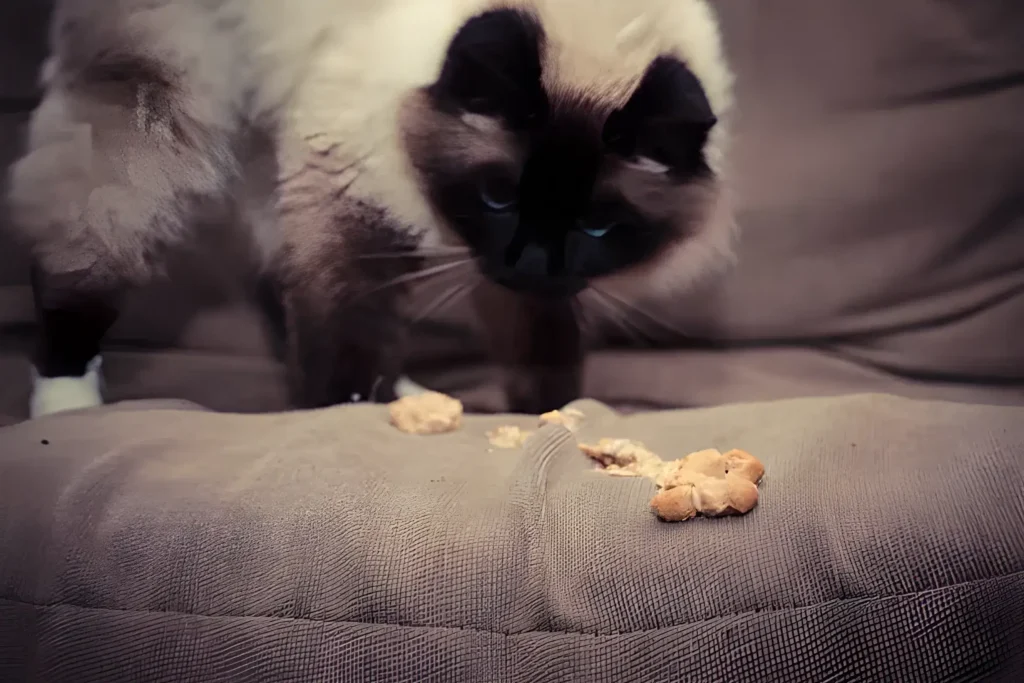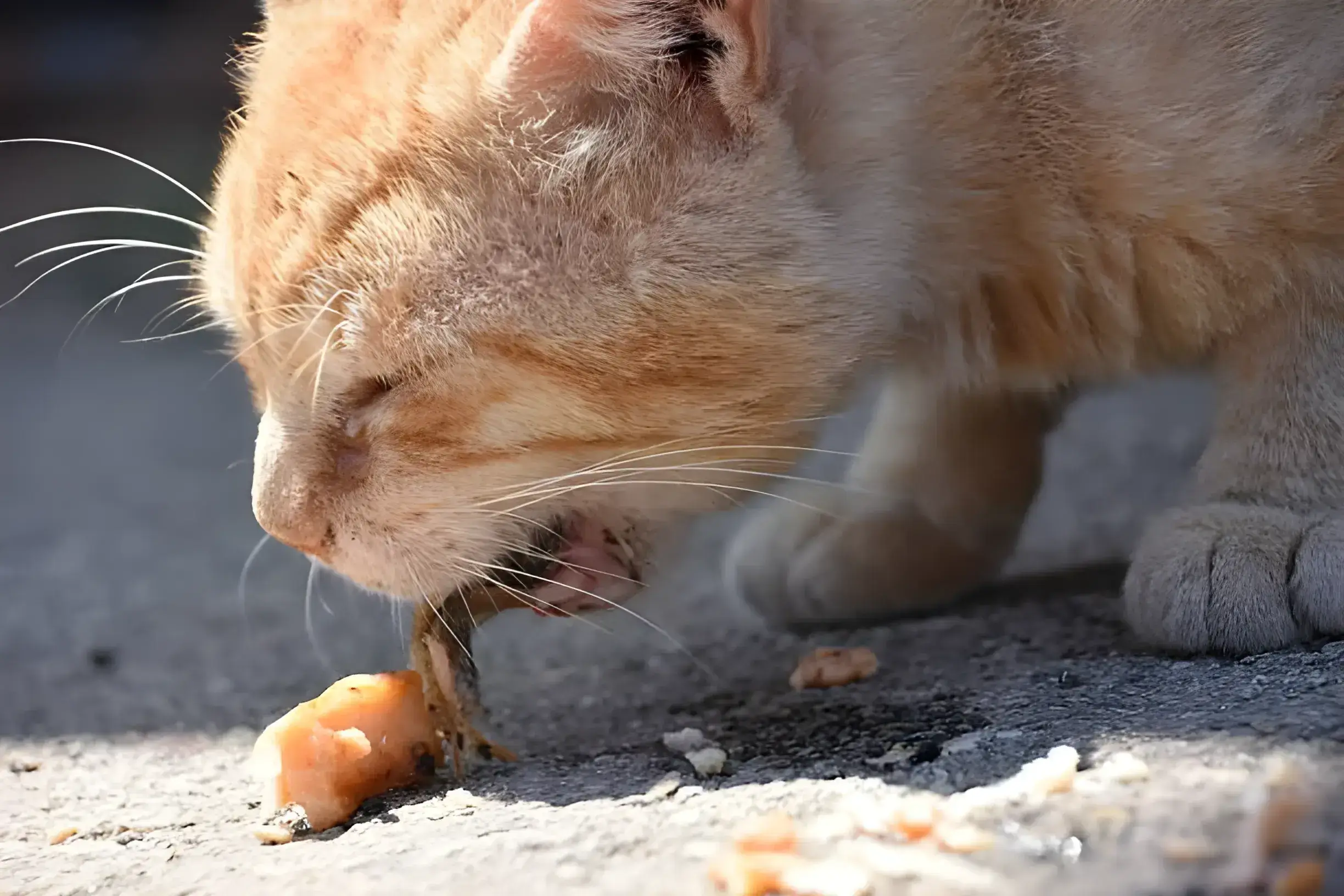Your cat’s repeated vomiting is likely caused by one of several factors, ranging from simple dietary issues to more serious health problems. It’s essential to understand the potential reasons to help your feline friend.
Understanding Vomiting vs. Regurgitation
Before diving into the causes, let’s distinguish between two often confused terms:
Vomiting: A forceful expulsion of stomach contents. It often involves abdominal heaving, retching sounds, and may contain partially digested food or yellow bile.
Regurgitation: A more passive process where undigested food comes up the esophagus effortlessly. It often looks like a tube-shaped mass of food.
Why Cats Vomit: Common Causes
Eating Habits: Cats who gobble their food too quickly or overeat can experience stomach upset or regurgitation due to inadequate digestion.
Hairballs: While cats groom themselves regularly, some ingested hair inevitably builds up. Most cats can pass hairballs with occasional vomiting, but frequent occurrences might need attention.
Dietary Issues: Cats can develop allergies or sensitivities to certain ingredients in their food. Sudden changes to their diet can also cause digestive distress.
Parasites: Intestinal parasites like worms irritate the digestive tract, often triggering vomiting as a symptom.
Serious Health Conditions: Chronic or persistent vomiting can sometimes indicate underlying medical conditions like inflammatory bowel disease (IBD), pancreatitis, kidney or liver problems, hyperthyroidism, or in some cases, cancer.
Types of Cat Vomit and What They Mean
The appearance of your cat’s vomit can offer clues to the cause. However, it’s crucial to consult your veterinarian for a proper diagnosis. Here’s a general guide:
Undigested food: May indicate eating too fast or food sensitivities.
Yellow bile: Vomiting on an empty stomach or potential liver problems (consult a vet immediately).
Foamy white liquid: Possible sign of stomach irritation or acid reflux.
Blood: Seek immediate veterinary attention.
Worms: Presence of parasites, necessitating deworming medication prescribed by a vet.
When is Vomiting a Cause for Concern?

Occasional vomiting is common in cats, but watch out for these red flags:
Frequency: Persistent vomiting multiple times a day or over several days warrants a vet visit.
Contents: Presence of blood, foreign objects, or large amounts of bile needs immediate veterinary attention.
Lethargy: If vomiting is accompanied by loss of energy, weakness, or loss of appetite, consult your vet.
Weight Loss: Significant weight loss alongside vomiting needs veterinary evaluation.
What to Do When Your Cat Vomits
Observe Carefully: Take note of how often your cat vomits, what they bring up, and if they display any other signs of illness (loss of appetite, changes in energy levels, etc.).
Withhold Food Temporarily: If your cat acts normal otherwise, it may be helpful to take away their food for a few hours to allow their stomach to rest. Make sure they still have access to fresh water.
Transition to Gentle Meals: After a short fast, reintroduce food slowly with a bland diet consisting of easily digestible ingredients like plain cooked chicken with a little rice.
When to See the Vet: Persistent vomiting, severe episodes, the presence of blood or unusual items in the vomit, or any accompanying lethargy or weakness warrant a prompt veterinary checkup.
Home Remedies for Occasional Vomiting
For mild, non-urgent cases of vomiting, these simple home remedies might offer relief (always consult your vet before using any):
Slippery Elm Bark: This natural supplement soothes the digestive tract. Look for pet-safe formulations and follow dosage instructions carefully.
Probiotics: These beneficial bacteria support healthy gut flora and can aid digestion. Choose a vet-recommended probiotic formulated specifically for cats.
Small amounts of plain, cooked pumpkin: Pumpkin is a good source of fiber, which can help regulate digestion. Offer a teaspoon or two, mashed in with bland food.
Preventing Vomiting in Cats

Slow Down Eating: Puzzle feeders or dividing meals into smaller portions can help cats who gulp their food.
Hairball Management: Regular brushing, specialized hairball diets, and hairball remedies can reduce hairball-related vomiting.
High-Quality Diet: Offer a balanced, premium cat food. If suspecting food sensitivities, your vet may recommend a limited ingredient or hypoallergenic diet.
Regular Vet Checkups: Routine checkups help catch underlying medical issues early on.
Age-Specific Considerations
Kittens: Kittens are more susceptible to parasites, accidental ingestion of foreign objects, and digestive upset due to a developing digestive system.
Adult Cats: Food sensitivities, hairballs, and the onset of chronic health conditions become more likely as cats age.
Senior Cats: Older cats have an increased chance of developing serious diseases that can manifest with vomiting as a symptom. Early veterinary intervention is crucial for them.
Vet’s Perspective
We included a brief Q&A with a veterinarian to further enhance the article’s authority:
When should a cat owner be most concerned about their cat’s vomiting?
“Always seek immediate veterinary attention if you see blood in your cat’s vomit, they have lost a significant amount of weight, or are increasingly lethargic along with the vomiting. Repeated vomiting over multiple days also warrants a visit.”
What are the typical diagnostic tests performed to find the underlying cause of a cat’s vomiting?
“The diagnostic approach depends on the suspected causes. Initial tests often include bloodwork, fecal analysis, and potentially X-rays. In some cases, more advanced diagnostics like ultrasounds or endoscopy might be required.”
Conclusion
Although occasional vomiting in cats can be normal, frequent occurrences require attention. By understanding the potential causes, monitoring your cat’s symptoms, providing home care when appropriate, and knowing when to seek veterinary attention, you can help ensure your feline friend’s health and well-being.
The photo featured below the post headline is Credit: WhitneyLewisPhotography/istockphoto
I hope you find this post helpful and informative. If Yes’ feel free to share it with your friends!
Frequently Asked Question
Can stress cause my cat to vomit?
Yes, stress or anxiety can trigger digestive upset in cats. Minimize changes to their routine and provide a calm, safe environment.
Could a plant in my home be causing the vomiting?
Many plants are toxic to cats. Check for nibble marks on any houseplants and consult a list of toxic plants. If you suspect plant poisoning, consult your vet or a pet poison helpline immediately.
How can I tell if my cat is vomiting or regurgitating?
Vomiting involves more forceful contractions, retching sounds, and stomach contents, while regurgitation is a passive process with undigested food.
Why does my cat keep throwing up but is acting fine?
Occasional vomiting, even if your cat seems otherwise normal, could indicate hairballs, a minor dietary intolerance, or eating too quickly. Monitor closely, and if vomiting persists or is accompanied by other symptoms, consult your vet.
What do you feed a cat that throws up a lot?
For frequent vomiting, temporarily switch to a bland diet of boiled chicken and rice. If the issue is ongoing, your vet may recommend a specialized gastrointestinal diet, limited ingredient diet, or hypoallergenic food.
Why does my cat vomit undigested food soon after meals?
This often indicates eating too quickly. Try the solutions above, and even slightly raising their food dish may help. If your cat continues to gulp their food, a vet visit is a good idea.
My cat throws up white foam – what does this mean?
White, foamy vomit can signify stomach irritation or sometimes an empty stomach. If it’s occasional, monitor closely. Persistent foamy vomiting necessitates a vet visit.
Can dehydration cause cats to vomit?
Yes! Ensure your cat always has fresh water available. Vomiting itself can lead to dehydration, so offer small amounts of water frequently if vomiting occurs.
Is it expected for older cats to vomit more frequently?
Older cats can have more sensitive digestive systems, and sometimes underlying health problems may develop. While a bit of occasional vomiting might not be alarming, increased vomiting or other concerning symptoms should be investigated by your vet.
Will hairball products help with my cat’s vomiting?
Yes, for cats experiencing frequent hairball-related vomiting, regular brushing, hairball-control foods, and safe hairball lubricants can offer relief by reducing hairball formation.

